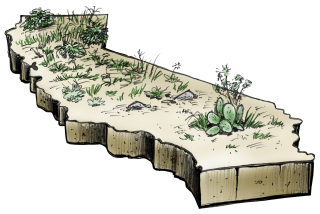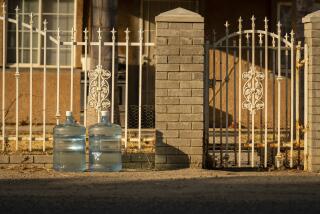It Isn’t Just ‘Their’ Water
- Share via
Los Angeles residents use an average of 156 gallons of water a day per person. That sounds ample, given that the Water Education Foundation says the average shower uses nine to 12 gallons. But in Sacramento the average citizen uses 290 gallons a day. The reason for the difference, in this water-short state, is all too easy to determine. For generations, residents of California’s Central Valley have considered it their birthright to use -- and waste -- as much water as they want. After all, it is “their” water.
Before water projects started pumping vast supplies south from the Sacramento-San Joaquin Delta in the 1950s and ‘60s, the water came down from the mountains in a series of rivers from the Sacramento in the north to the Kern in the south. Whatever the valley folk didn’t use just flowed out to San Francisco Bay and the Pacific Ocean.
That’s why hundreds of thousands of homes and businesses in the valley still do not have water meters. Customers pay a flat rate. Your next-door neighbor may use twice the water you do, for the same fee.
But these residents are now up against a changed environment.
Much of the Northern California water now flows southward to farms in the San Joaquin Valley and cities in Southern California. The state population has soared beyond 35 million. The water supply is stretched thin, even in years when the runoff from the mountain snowpack is normal or high. And a key source of water for the state, the Colorado River, is running low after years of drought. No Californian can rationalize wasting water now.
That’s why Assembly Bill 2572 is so vital. The measure, by Assemblywoman Christine Kehoe (D-San Diego), would require cities such as Sacramento to install water meters at all existing homes over a 20-year period.
New homes have had to have meters since 1992. But Sacramento still charges its residents a flat rate. That would end, finally, under AB 2572.
Kehoe’s measure passed the Assembly last week on a vote of 56 to 13 and now goes to the Senate, where its approval is not assured. Sacramento officials complained of the cost -- $150 million to $200 million -- to install the meters.
Sacramento utilities director Gary Reents questioned whether the city would save much water by installing meters. The contrast between daily water usage in Los Angeles and Sacramento indicates that the doubts are unwarranted.
More to Read
Sign up for Essential California
The most important California stories and recommendations in your inbox every morning.
You may occasionally receive promotional content from the Los Angeles Times.













